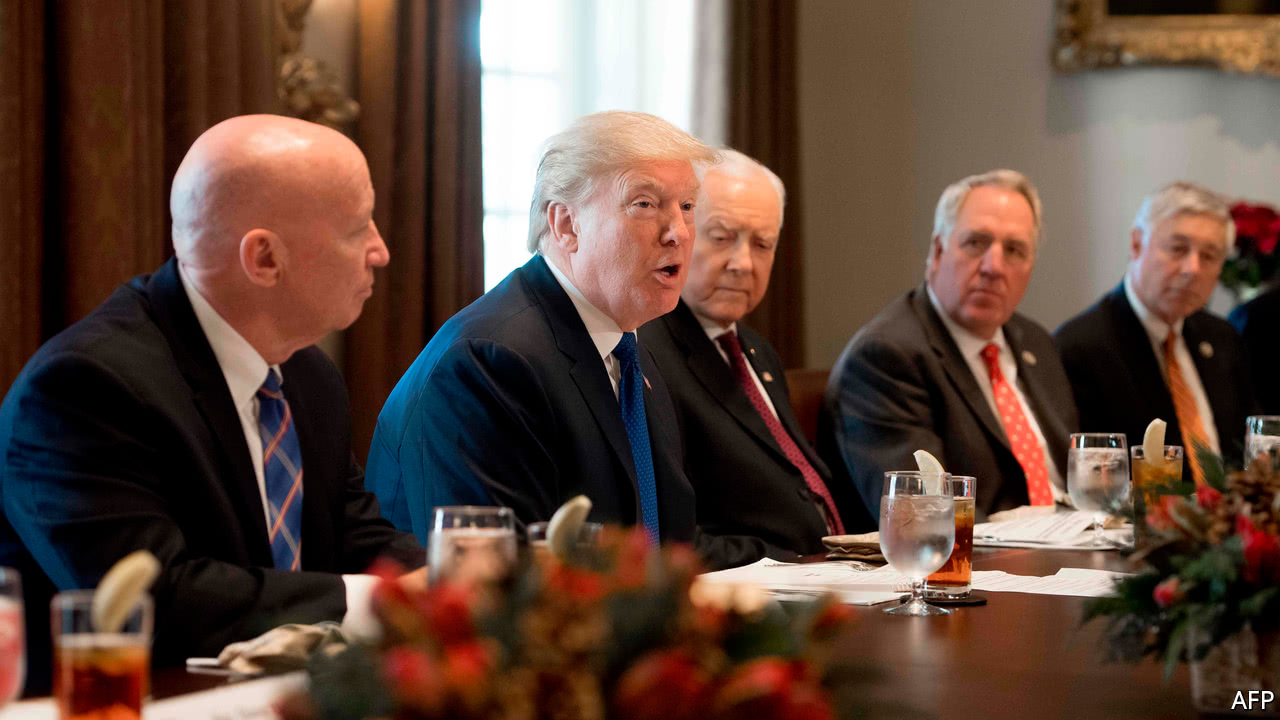
PRESIDENT DONALD TRUMP’S effort to change America’s tax code is approaching the finishing line. Republican negotiators from the Senate and the House of Representatives this week hashed out a consensus bill behind closed doors. On December 13th, Mr Trump expressed confidence that he would be able to sign the reform into law before Christmas.
The key provision is the slashing of the corporate tax rate, from 35% to 21%. Big business in America uniformly cheers this reduction. The US Chamber of Commerce calls it a measure to “grow the economy, create jobs, and increase paychecks”. The Tax Foundation, a right-leaning think-tank, claims that reducing the corporate rate to 20%, just one percentage point lower, would increase the size of the economy by 2.7% over the long run. Yet big firms are less enamoured of controversial international provisions that may make it into the final law. Both the Senate bill and the House bill try to stop the shifting of profits by American multinationals (MNCs) to affiliates in lower-tax countries by imposing some form of tax on cross-border transactions between business units.
-
Retail sales, producer prices, wages and exchange rates
-
Foreign reserves
-
“The Last Jedi” tears down—and rebuilds—the Star Wars franchise
-
Why Turkey and Greece cannot reconcile
-
When politicians and executives get caught out
-
Lessons from ancient Greek coinage
MNCs, both American and foreign, worry that such measures will throttle global supply chains. A trade association for foreign carmakers with operations in America calls the reform effort “highly problematic.” America’s big trading partners are also concerned. This week, finance ministers from five European countries wrote a joint letter to Steven Mnuchin, America’s treasury secretary, warning that the proposals could violate tax treaties and rules of the World Trade Organisation.
Yet the Republican leadership will move heaven and earth to forge an agreement—however imperfect—before Christmas. Republicans have only a slender majority in the Senate. The taking of a Senate seat in Alabama by Doug Jones, a Democrat, on December 12th (pending a possible recount) suggests that the best hope for Republicans is to strike a deal before he takes office early next year.
The final details of the consensus bill remain uncertain, but two things already seem clear. First, whatever law is passed, lobbying will continue. The last such effort of a similar scale, the tax reform of 1986, was the result of years of work and bipartisan consensus. That comprehensive law stood the test of time. In contrast, this year’s rushed effort seems likely to leave important constituencies dissatisfied.
Technology-intensive firms are up in arms about a proposed reduction in tax breaks for investing in research and development. Drugmakers are fighting a provision that would make it more expensive to develop “orphan drugs” for serious diseases affecting relatively few people. Many other lobbies are unhappy. All will agitate for changes to the tax code in future.
Second, tax experts have outlined ways in which the Republican proposals can be gamed. Companies would be able to manipulate a deduction for export earnings, for example, by “round-tripping” products out of and then back into America. Individuals can benefit, too. They can set up corporations and give up salaries, taxed at rates of 40% or more, in favour of fees paid by those firms, which would be taxed at 20%. Other examples abound. The main winners from all this seem likely to be accountants and tax lawyers. Gaming the American tax code used to be a select, corporate sport, but it now looks to become everyman’s pastime.
Source: economist
American business has concerns on tax reform